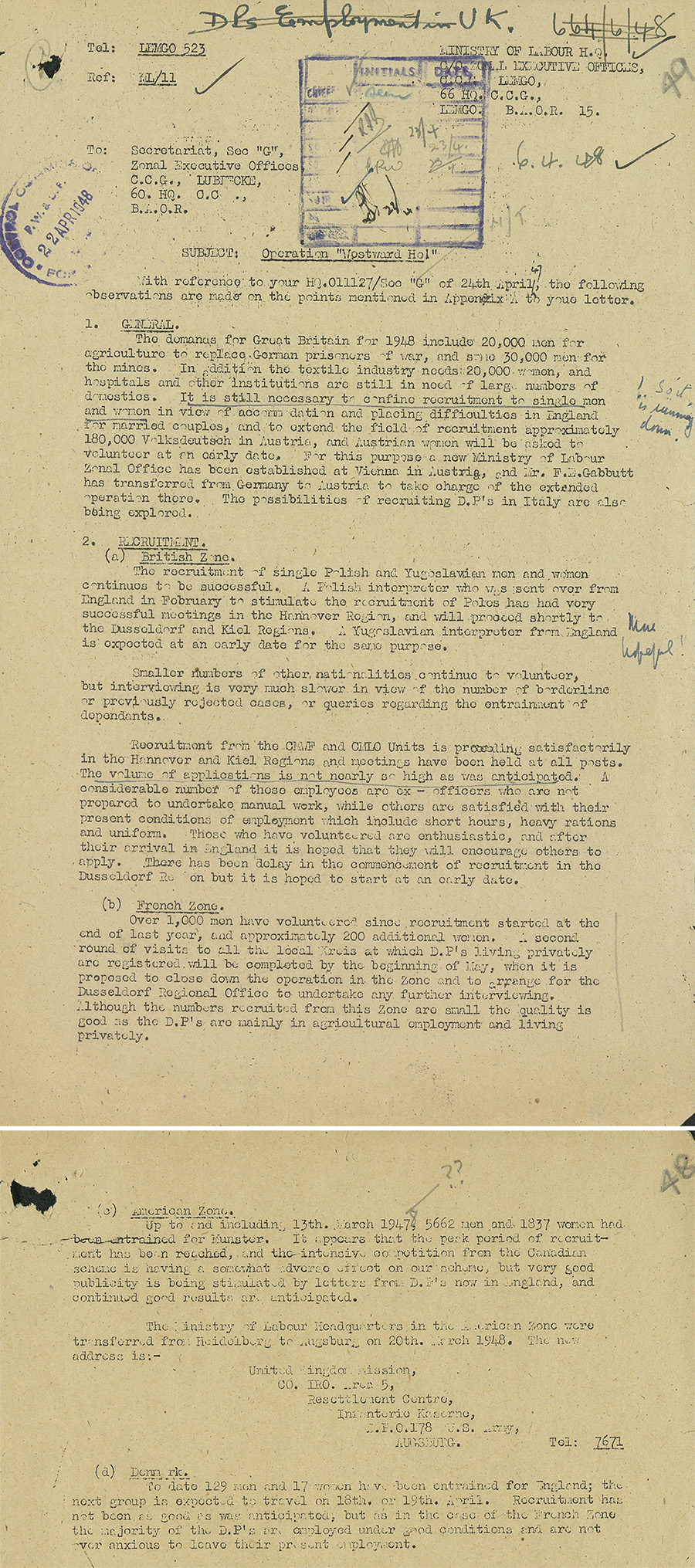
Extract from a document describing the ‘Westward Ho!’ scheme developed for the Allied resettlement of refugees and displaced persons after the Second World War, 6 April 1948. Catalogue ref: FO 1052/487
- What was the ‘Westward Ho’ policy?
- Why was recruitment of single men and women preferable?
- Why does the document refer to the British, French, and American ‘Zones’?
- How does this scheme compare to the plans for Empire Windrush arrivals?
Transcript
To: Secretariat, Sec “G”,
Zonal Executive Offices,
C.C.G., LUBBECKE,
60. HQ. O.C.
B.A.O.R. [British Army of the Rhine]
Ministry of Labour H.Q.
C/O Zonal EXECUTIVE OFFICES
C.C.G. LEMGO
66 HQ. C.C.G.,
LEMGO B.A.O.R. 15.
SUBJECT: Operation “Westward Ho”
With reference to your HQ. 011127/Sec “G” of 24th April, the following observations are made on the points mentioned in Appendix A to your letter.
- GENERAL
The demands for Great Britain for 1948 include 20,000 men for agriculture to replace German prisoners of war and some 30,000 men for the mines. In addition, the textile industry needs 20,000 women, and hospitals and other institutions are still in need of large numbers of domestics. It is still necessary to confine recruitment to single men and women in view of accommodation and placing difficulties in England for married couples, and to extend the field of recruitment approximately 180,000 Volksdeutsch in Austria, and Austrian women will be asked to volunteer at an early date. For this purpose a new Ministry of Labour Zonal Office has been established in Vienna in Austria, and Mr. F.E. Gabbutt has transferred from Germany to Austria to take charge of the extended operation there. The possibilities of recruiting D.P.s (displaced persons) in Italy are also being explored.
- RECRUITMENT
- British Zone
The recruitment of single Polish and Yugoslavian men and women continues to be successful. A Polish interpreter who was sent over from England in February to stimulate the recruitment of Poles has had very successful meetings in the Hannover Region and will proceed shortly to the Dusseldorf and Kiel Regions. A Yugoslavian interpreter from England is expected at an early date for the same purpose.
Smaller numbers of other nationalities continue to volunteer, but interviewing is very much slower in view of the number of borderline or previously rejected cases, or queries regarding the entrainment [boarding trains] of dependents.
Recruitment from CMWF and CMLO Units in proceeding satisfactorily in Hannover and Kiel Regions and meetings have been held at all posts. The volume of applications is not nearly as high as was anticipated. A considerable number of those employees are ex-officers who are not prepared to undertake manual work, while others are satisfied with their present conditions of employment which include short hours, heavy rations and uniform. Those who have volunteered are enthusiastic, and after their arrival in England it is hoped that they will encourage others to apply. There has been delay in the commencement of recruitment in the Dusseldorf Region, but it is hoped to start at an early date.
- French Zone
Over 1,000 men have volunteered since recruitment started at the end of the last year, and approximately 200 additional women. A second round of visits to all the local Kreis [unit of German local government] at which D.P.’s living privately are registered will be completed by the beginning of May, when it is proposed to close down the operation in the Zone to arrange for the Dusseldorf Regional Office to undertake any further interviewing. Although the numbers recruited from this Zone are small the quality is good as the D.P.’s are mainly in agricultural employment and living privately.
- American Zone
Up to and including 13th March 1947?8, 5662 men and 1837 women had been entrained for Munster. It appears that the peak period of recruitment has been reached, and the intensive competition from the Canadian scheme is having a somewhat adverse effect on our scheme, but very good publicity is being stimulated by letters from D.P.’s [displaced persons] now in England and continued good results anticipated.
The Ministry of Labour Headquarters in the American Zone were transferred from Heidelberg to Augsburg on 20th March 1948. The new address is: –
…
- Denmark
To date 129 men and 17 women have been entrained for England; the next group is expected to travel on 18th or 19th April. Recruitment has not been as good as was anticipated, but as in the case of the French Zone, the majority of the D.P.s are employed under good conditions and are not over anxious to leave their present employment.8
